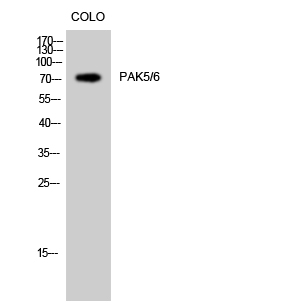PAK5/6 Polyclonal Antibody
- Catalog No.:YT3574
- Applications:WB;ELISA
- Reactivity:Human;Mouse
- Target:
- PAK5/6
- Fields:
- >>ErbB signaling pathway;>>Ras signaling pathway;>>Axon guidance;>>Focal adhesion;>>T cell receptor signaling pathway;>>Regulation of actin cytoskeleton;>>Human immunodeficiency virus 1 infection;>>Renal cell carcinoma
- Gene Name:
- PAK6/PAK7
- Protein Name:
- Serine/threonine-protein kinase PAK 6/7
- Human Gene Id:
- 57144/56924
- Human Swiss Prot No:
- Q9P286/Q9NQU5
- Mouse Gene Id:
- 241656/214230
- Immunogen:
- The antiserum was produced against synthesized peptide derived from human PAK5/6. AA range:566-615
- Specificity:
- PAK5/6 Polyclonal Antibody detects endogenous levels of PAK5/6 protein.
- Formulation:
- Liquid in PBS containing 50% glycerol, 0.5% BSA and 0.02% sodium azide.
- Source:
- Polyclonal, Rabbit,IgG
- Dilution:
- WB 1:500 - 1:2000. ELISA: 1:40000. Not yet tested in other applications.
- Purification:
- The antibody was affinity-purified from rabbit antiserum by affinity-chromatography using epitope-specific immunogen.
- Concentration:
- 1 mg/ml
- Storage Stability:
- -15°C to -25°C/1 year(Do not lower than -25°C)
- Other Name:
- PAK7;KIAA1264;PAK5;Serine/threonine-protein kinase PAK 7;p21-activated kinase 5;PAK-5;p21-activated kinase 7;PAK-7;PAK6;PAK5;Serine/threonine-protein kinase PAK 6;PAK-5;p21-activated kinase 6;PAK-6
- Observed Band(KD):
- 75kD
- Background:
- The protein encoded by this gene is a member of the PAK family of Ser/Thr protein kinases. PAK family members are known to be effectors of Rac/Cdc42 GTPases, which have been implicated in the regulation of cytoskeletal dynamics, proliferation, and cell survival signaling. This kinase contains a CDC42/Rac1 interactive binding (CRIB) motif, and has been shown to bind CDC42 in the presence of GTP. This kinase is predominantly expressed in brain. It is capable of promoting neurite outgrowth, and thus may play a role in neurite development. This kinase is associated with microtubule networks and induces microtubule stabilization. The subcellular localization of this kinase is tightly regulated during cell cycle progression. Alternatively spliced transcript variants encoding the same protein have been described. [provided by RefSeq, Jul 2008],
- Function:
- catalytic activity:ATP + a protein = ADP + a phosphoprotein.,function:The activated kinase acts on a variety of targets.,PTM:Autophosphorylated when activated by CDC42/p21.,similarity:Belongs to the protein kinase superfamily. STE Ser/Thr protein kinase family. STE20 subfamily.,similarity:Contains 1 CRIB domain.,similarity:Contains 1 protein kinase domain.,subunit:Interacts tightly with GTP-bound but not GDP-bound CDC42/p21 and RAC1.,tissue specificity:Predominantly expressed in brain.,
- Subcellular Location:
- Mitochondrion. Cytoplasm. Nucleus. Shuttles between the nucleus and the mitochondria, and mitochondrial localization is essential for the role in cell survival.
- Expression:
- Predominantly expressed in brain.
- June 19-2018
- WESTERN IMMUNOBLOTTING PROTOCOL
- June 19-2018
- IMMUNOHISTOCHEMISTRY-PARAFFIN PROTOCOL
- June 19-2018
- IMMUNOFLUORESCENCE PROTOCOL
- September 08-2020
- FLOW-CYTOMEYRT-PROTOCOL
- May 20-2022
- Cell-Based ELISA│解您多样本WB检测之困扰
- July 13-2018
- CELL-BASED-ELISA-PROTOCOL-FOR-ACETYL-PROTEIN
- July 13-2018
- CELL-BASED-ELISA-PROTOCOL-FOR-PHOSPHO-PROTEIN
- July 13-2018
- Antibody-FAQs
- Products Images

- Western Blot analysis of COLO cells using PAK5/6 Polyclonal Antibody



